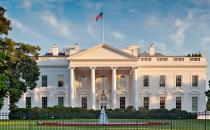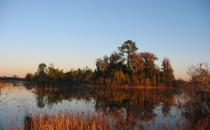Biden admin takes bold action on climate change and environmental justice
President Biden’s first two weeks in office have set out an incredibly ambitious environmental agenda, promising a broad response to the climate crisis and environmental justice. If the Administration follows through and gets this right, it will have big implications for our work in the South.
“Climate change and environmental injustice are urgent priorities for SELC, and we are grateful to have a federal Administration that shares our commitment,” says SELC Program Director DJ Gerken. “The South is the front line for tackling these twin crises and we look forward to applying SELC’s on-the-ground expertise to help the Administration find practical solutions.”
On the campaign trail, climate and equity action was one of Biden’s biggest promises. Here’s a look at how his team is managing our county’s top environmental concerns, and how they will affect our region.
Environmental justice
With the creation of the White House Council on Environmental Justice and a directive to all federal agencies to develop strategies for addressing disproportionate environmental impacts, the new administration is already working toward securing a healthy environment for all Americans.
A new initiative called Justice40 would require 40 percent of the benefits from federal investments in clean energy and clean water to go to communities bearing disproportionate pollution.
Environmental justice is paramount in the South, given its long history of racial injustice and inequity. For years, SELC has been working with partners across the region to enforce laws that fight environmental injustice because we’ve seen the gaps that cause some communities to be overlooked.
“SELC is determined to close those gaps in the law,” says Senior Attorney Chandra Taylor, who specializes in environmental justice. “And after four years of major setbacks, we’re grateful for an administration that’s finally on the same page about the unjust climate impacts these communities have been forced to bare.”
Climate action
On his first day in office, President Biden signed an Executive Order to rejoin the Paris Accord—the worldwide agreement on climate change mitigation, adaptation, and finance that the previous administration opted to withdraw from.
In stark contrast to a White House bent on denying climate change, Biden is pushing for a carbon pollution-free electricity sector no later than 2035, and to eliminate fossil fuel subsidies. The new administration has also paused new oil and gas leasing on all public lands and waters, including the Outer Continental Shelf, adding further obstacles to fossil fuel companies seeking to drill in the Atlantic Ocean.
In the South, we’re already leading the way on deploying the clean energy needed to meet that ambitious goal, and we’re working to accelerate that change even faster.
Coastal resilience
We’ve known our seas are rising—in fact, we produced an entire podcast season on the many ways Southern cities like Norfolk and Charleston are navigating the changing tides.
Biden’s team has directed every federal agency to develop proposals to bolster adaptation and resilience to this climate crisis we’re all too familiar with in the South.
“SELC has deep expertise working with local and state partners to build climate resilient communities across our region,” says Gerken. “We will apply that experience to help the Administration tale concrete steps with real world benefit.”
Directive to review Navigable Waters Rule
SELC has led the fight to stop the greatest loss of clean water protections in American history, initiated by Trump’s gutting of the Clean Water Act, which significantly reduced the scope of which streams and wetlands are protected.
A critical review of the Navigable Waters Rule would help so much of our work in the South, including protecting the iconic Okefenokee Swamp and National Wildlife Refuge from a titanium mine enabled by the Trump rollbacks.
Conserve 30% of our lands and waters
“Southerners love our public lands, but the Trump administration fought tooth and nail to silence our voices about how they should be managed,” says Gerken.
Too often, national discussion about public lands and conservation focus on western landscapes. It is critical that the east, and especially the southeast, where resources are accessible and enjoyed by millions of Americans and strained by our rapidly developing region be front and center.
As the new administration mulls over how to use and protect our public lands, we’re committed to making sure there’s a seat at the table for the Southeast.




